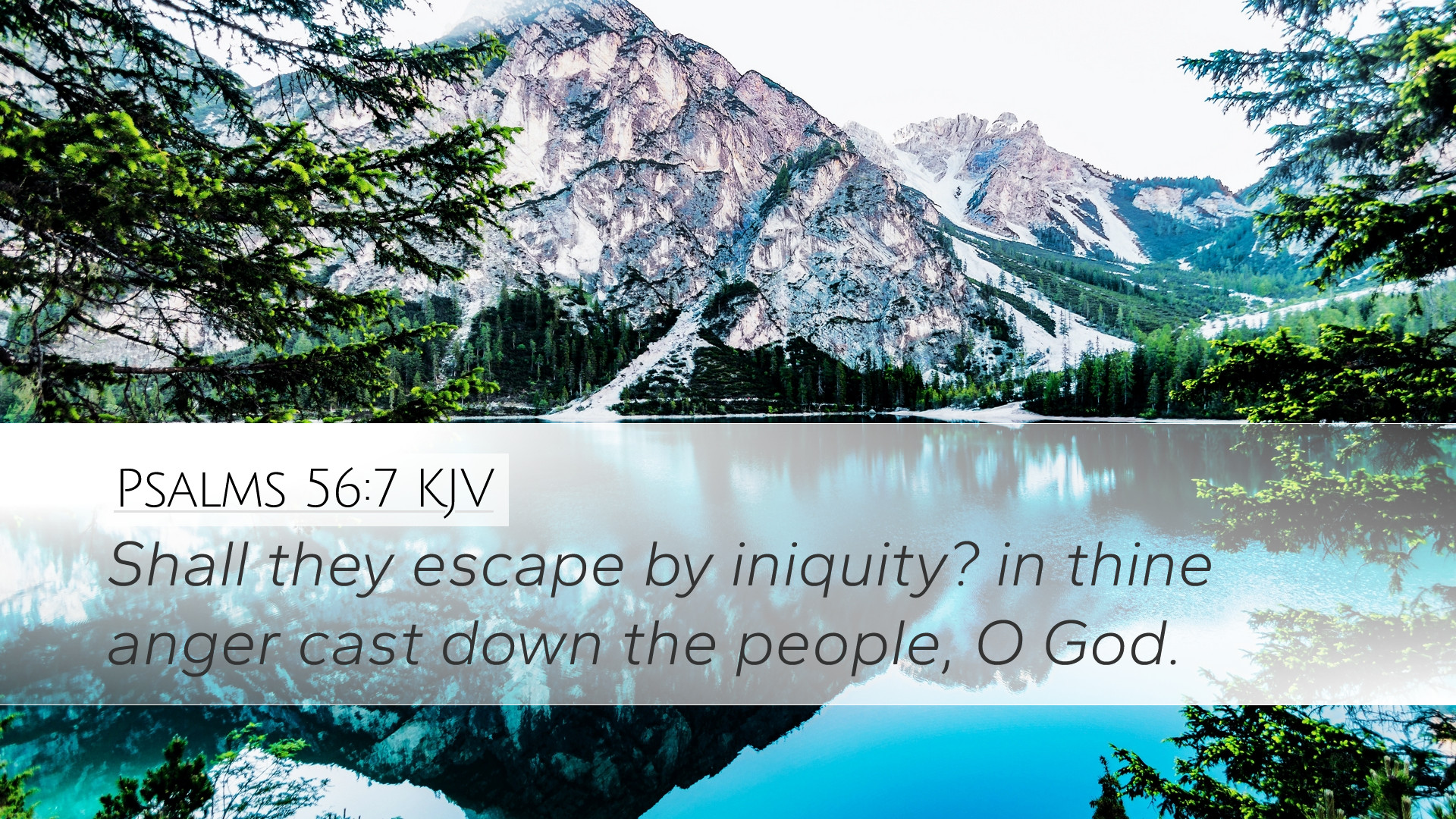Commentary on Psalm 56:7
This verse states, "Shall they escape by iniquity?" which captures a profound desire for divine justice amidst the struggles faced by the psalmist. This commentary seeks to provide insights and reflections from notable public domain commentators.
Context and Importance
The psalmist, likely David, is expressing a moment of turmoil, facing adversaries who seek his life. Throughout Psalm 56, the themes of trust in God amidst fear and the pursuit of justice are dominantly woven together.
Insights from Matthew Henry
Matthew Henry emphasizes the psalm's overarching theme of divine protection. He notes that the inquiry, "Shall they escape by iniquity?" reflects a deep yearning for the righteousness of God to prevail. Henry elaborates that in moments of distress, the believer must cling to the promise that no evil will ultimately succeed when placed before God's judgment.
In his commentary, he expresses that the enemies of the believer may seem to prosper momentarily, but iniquity will not stand before God’s justice. Henry highlights that this verse showcases the tension between earthly struggles and divine oversight, encouraging believers to trust God's plan for vindication.
Insights from Albert Barnes
Albert Barnes interprets Psalm 56:7 within the framework of the psalmist's plea for justice. He remarks that the psalmist is overwhelmed by the cruelty and treachery of his enemies, which leads him to cry out for God’s intervention. The rhetorical question posed indicates a challenge to the idea that the wicked can continually prevail without consequence.
Barnes asserts that this verse reflects a universal truth: God's justice will ultimately address the iniquities of the wicked. He suggests that believers can find solace in the assurance that their suffering does not go unnoticed by God and that He will act in due time to right the wrongs they face.
Insights from Adam Clarke
Adam Clarke offers a detailed linguistic analysis of this verse, focusing on the notion of iniquity and its implications for justice. He describes iniquity as an affront to divine righteousness, leading to inevitable judgment. Clarke posits that the psalmist’s longing for justice is not only a personal plea but also a reflection of a foundational theological principle: the expectation of divine justice.
Clarke elaborates that the term "escape" implies a sense of urgency and desperation regarding justice. The question underscores the inconsistency of iniquity with God’s character. Clarke concludes that this verse serves as a reminder and a warning that ultimately, righteousness will prevail over wickedness.
Theological Reflections
The robust discussion among these commentators reveals a rich theological canvas painted with themes of divine justice, human suffering, and the ultimate vindication of the faithful. This verse invites deeper contemplation within pastoral and theological settings:
- The Sovereignty of God: The verse emphasizes God's active role in judging iniquity and protecting His people.
- Human Suffering: This passage acknowledges the reality of suffering and provides comfort to those facing persecution.
- Hope in Justice: Believers are called to maintain hope that justice will ultimately prevail through God’s intervention.
- The Call to Righteousness: There is a clear moral imperative to pursue righteousness in the face of adversity, echoing the inherent nature of God’s justice.
Practical Applications
This verse serves several practical purposes for pastoral ministry, education, and scholarship:
- Encouraging the Faithful: This scripture can be used in sermons to remind congregants of God's faithfulness during trials.
- Teaching on Justice: Educators can use this verse to illustrate biblical teachings on justice and morality.
- Counseling: It offers a framework for counseling those distressed by injustice, providing hope and divine assurance.
- Personal Reflection: Scholars and theologians can use this verse as a basis for meditation on God's character and the nature of suffering.
Conclusion
Psalm 56:7 stands as a powerful reminder of the steadfastness of God in the face of imploring questions regarding justice. By extracting insights from various esteemed commentators, the complexities inherent in this text are illuminated, providing a profound source of reflection for pastors, students, theologians, and scholars alike. Herein lies an affirmation of faith in God’s righteous governance amidst the discrepancies of human experience.


